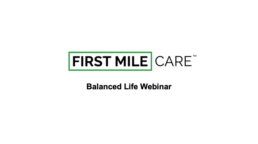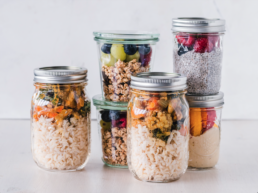By Kathy Gregory, First Mile Care, DPP Coach
The new year is traditionally a time for self-reflection. After a difficult year of adjusting to a “new normal,” it’s time for a re-set of ambitions and expectations for the year to come. “Leading a Balanced Life” is a session in the First Mile Care ongoing series of “Diabetes Prevention in Action” webinars that provides guidance for improving your health and your overall life in the new year.
Achieving a healthy balance in life sometimes seems as likely as stumbling across a unicorn. Healthy balance usually means finding a satisfactory degree of success in the areas of your life that contribute to your overall well-being: health, physical activity, home cooking, home environment, relationships and social life, joy, spirituality, creativity, finances, career, education, etc.
If you rate your success in each of these areas, you’ll undoubtedly find some imbalances. It’s important to remember that success in these areas is measured by you and not by comparisons to other people. You get to decide what success feels like for you, which will be different than it is for other people.
Oftentimes, in the areas where you’re struggling, you may not be spending as much time and energy as you need to achieve success. How can you make space for these changes to create a better balance, and do you need help from others to do it?
Six building blocks for a healthier balance
In the area of health, there are six specific building blocks to consider when trying to achieve a better life balance. They are interconnected, so that when you make improvements to one, you’ll tend to see improvements elsewhere. Here are some questions to ask yourself to evaluate your health balance.
- Nutrition: How healthy are your eating habits? How would you rate the quality and the variety of the foods that you eat? How often do you plan your meals, and how healthy is your meal prep?
- Physical activity: Are you active or sedentary throughout your day? How often do you exercise each week, and do you do exercises that you enjoy? What obstacles are getting in your way for exercising? (The First Mile Care DPP program has a goal of 150 minutes of physical activity a week at a minimum.)
- Sleep: What is the quantity and quality of your sleep? Do you have a sleep ritual that signifies when it’s time to wind down? How is your sleep environment? How often do you have a hard time falling back asleep? (Learn more about healthy sleep habits in this First Mile Care webinar.)
- Stress: How would you rate your stress level? How is stress affecting your mental and physical health? What are your current coping mechanisms for managing stress? (If you’re experiencing more stress than a year ago … you’re very normal.)
- Healthy mind and feelings: Do you have a positive attitude or do you struggle with negativity and discouragement? How would you describe your internal self-talk? Do you have some type of gratitude practice?
- Empowerment and planning: Do you plan for success or do you just jump right in and hope for the best? Do you tend to use the resources available to you or go at new opportunities alone?
How success looks to you
A new year has begun. Choose one to three areas in your life in which you would like to see changes this year. Think about how changes in these areas could affect your overall health. Determine what empowerment and planning strategies need to be in place in order for you to succeed.
Creating an action plan is very helpful when it comes to setting goals for yourself in order to create lasting change. It’s also helpful to create definite space in your schedule as too often, if it’s not on your calendar, it may not happen. Sharing your goals with a friend or a family member can also be very beneficial in keeping you accountable towards your goals. Community support is one of the most powerful success motivators of the First Mile Care Diabetes Prevention Program.
Please watch the webinar and work though my “Wheel of Life” self-assessment activity to help you determine how to create better balance in your life. And happy new year!
To learn more about how you can benefit from the First Mile Care Diabetes Prevention Program, take the prediabetes risk test and get started today!




